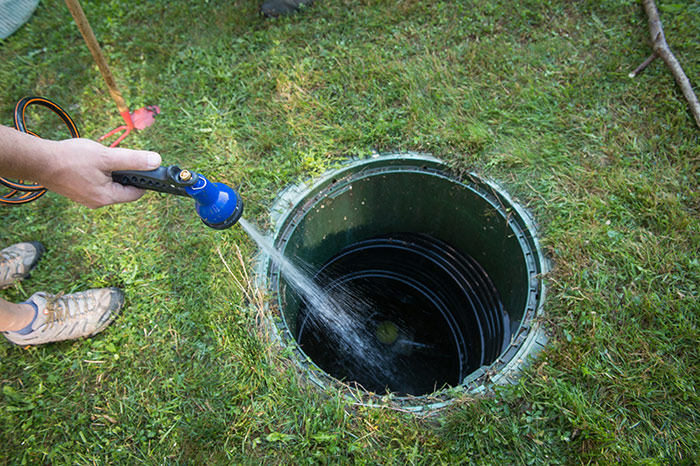
The best way to prevent damage to your septic system during a massive rainstorm is to maintain your system properly. There are a few things you can do to prepare your system for a storm:
- Have your system pumped every three to five years. To ensure your system is prepared to handle more water than usual, make sure you pump as recommended. A full septic tank is a recipe for disaster during a heavy storm, especially if it floods.
- Have your system inspected as recommended. To always be prepared for a downpour, have a professional inspect your septic system every three years. This routine check will ensure that all major problems are fixed before the weather gets bad.
- Watch what you put down your drains. As mentioned above, sending non-biodegradable materials down the drain can cause clogs. Make sure to toss food scraps into the trash. Never pour grease or oil down the kitchen sink. Always dispose of sanitary products and diapers in the trash, not the toilet.
- Keep runoff water away from your drainfield. Make sure that gutters aren’t spilling out onto your drainfield. This will cause excess rainwater absorption in the soil and make it hard for your drainfield to filter wastewater.
- Keep vehicles off your drainfield. Try your best not to park or drive over your drainfield. The added weight will weaken the soil and decrease its ability to filter wastewater.
Can Rain Cause My Septic Tank to Flood?
After heavy rainfall, it can be difficult to determine if flooding is causing issues with your septic tank. This has to do with the fact that the symptoms of a flooded tank are very similar to those of a tank that needs pumping or a pipe that’s clogged.
However, if you recently received a substantial amount of rain and are having problems with water draining in your home’s drains, it’s possible that your tank may be flooded. If this is the case, you may want to contact a professional to inspect and diagnose the issue.
In the meantime, your best course of action is to reduce the use of faucets or appliances that use water in your home. This will give your drainfield time to dry out. Pumping the tank or adding chemicals to help ease draining are not viable solutions. Unfortunately, all you can do is limit your water usage and set up an appointment with a septic tank specialist to determine solutions and evaluate any potential damage.
Source: upgradedhome.com
